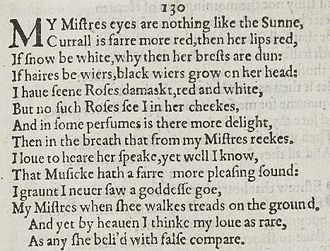Poem by William Shakespeare
| Sonnet 130 |
|---|
 Sonnet 130 in the 1609 Quarto |
 |
|
|
My mistress’ eyes are nothing like the sun;
Coral is far more red than her lips’ red:
If snow be white, why then her breasts are dun;
If hairs be wires, black wires grow on her head.
I have seen roses damask’d, red and white,
But no such roses see I in her cheeks;
And in some perfumes is there more delight
Than in the breath that from my mistress reeks.
I love to hear her speak, yet well I know
That music hath a far more pleasing sound:
I grant I never saw a goddess go,
My mistress, when she walks, treads on the ground:
And yet, by heaven, I think my love as rare
As any she belied with false compare.
|
|
|
|
—William Shakespeare[1]
|
| |
Sonnet 130 is a sonnet by William Shakespeare, published in 1609 as one of his 154 sonnets. It mocks the conventions of the showy and flowery courtly sonnets in its realistic portrayal of his mistress.
